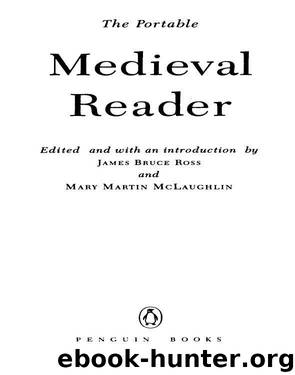The Portable Medieval Reader by Various

Author:Various
Language: eng
Format: epub
Publisher: Penguin Publishing Group
Published: 2010-03-01T05:00:00+00:00
His Own Deeds
GIRALDUS CAMBRENSIS
Twelfth century
GIRALDUS was born [c. 1145-47] in South Wales, on the coast of Dyfed, not far from the principal town of Pembroke, that is, in the castle of Manorbier, of noble stock. For his mother was Angarath, the daughter of Nesta, the noble daughter of Rhys, prince of South Wales ... who was married to the distinguished man, William de Barri. Giraldus was the youngest of four blood-brothers. And when the three others in their childish games used to build castles and cities and palaces in the sands or mud, as a prelude to their future life, he, as a like prelude, always devoted himself entirely to building churches and to constructing monasteries. His father, often noting and wondering at his custom, took it as a prophecy of the future, and determined with wise forethought to have him study letters and liberal arts; and, with teasing praise, he used to call him his “little bishop.”
It happened one night that the land was harassed by an enemy invasion, and all the able-bodied young men of the castle rushed swiftly to arms. When the boy saw this and when he heard the tumult, he wept aloud and seeking a safe place to hide, asked that he be carried to the church, thus declaring in a marvellous spirit of prophecy that the peace of the church and the immunity of God’s house should be most firm and secure. When everyone heard this, the tumult ceased, and pondering these boyish words, and conferring among themselves, they remembered with amazement that his words promised for himself greater safety in this remote church, exposed to the winds and to chance, than in any city filled with men and arms, and well fortified with towers and walls....
In these early days, then, the boy was not a little hindered by the companionship of his brothers, who played with him on holidays and praised as highly as possible the business of their knightly profession, for a boy’s manners are formed by those who live with him. Finally, however, he was much moved by the rebuke and immediate correction of that Bishop David of St. David’s, of pious memory, who was his own uncle; and also by two clerks of the same bishop, one of whom rebuked him by declining the adjective “durus, durior, durissimus,” and the other, “stultus, stultior, stultissimus.” This insult stirred him deeply, so that he began to make progress, aided more by shame than by the rod, and by this disgrace rather than by his teacher or by fear. Afterwards, therefore, he was so wrapped in zeal for his studies that within a short time he far surpassed all his schoolfellows of the same age in his native land. In the course of time, he crossed the sea three times to France, for the sake of further study and profit, and studied for three periods of several years in liberal arts at Paris, until at length, rivalling the most excellent teachers, he taught the trivium there with great success, and won distinguished praise in the art of rhetoric.
Download
This site does not store any files on its server. We only index and link to content provided by other sites. Please contact the content providers to delete copyright contents if any and email us, we'll remove relevant links or contents immediately.
The Art of Coaching Workbook by Elena Aguilar(50854)
Trainspotting by Irvine Welsh(21484)
The Secret History by Donna Tartt(18803)
Twilight of the Idols With the Antichrist and Ecce Homo by Friedrich Nietzsche(18475)
All the Missing Girls by Megan Miranda(15488)
Cat's cradle by Kurt Vonnegut(15149)
Ready Player One by Cline Ernest(14490)
Talking to Strangers by Malcolm Gladwell(13183)
Fangirl by Rainbow Rowell(9065)
The remains of the day by Kazuo Ishiguro(8787)
The Compound Effect by Darren Hardy(8784)
Thirteen Reasons Why by Jay Asher(8765)
Tools of Titans by Timothy Ferriss(8184)
Periodization Training for Sports by Tudor Bompa(8144)
Wonder by R. J. Palacio(7973)
The Lover by Duras Marguerite(7803)
A Court of Wings and Ruin by Sarah J. Maas(7618)
Change Your Questions, Change Your Life by Marilee Adams(7609)
The Complete Stick Figure Physics Tutorials by Allen Sarah(7290)
